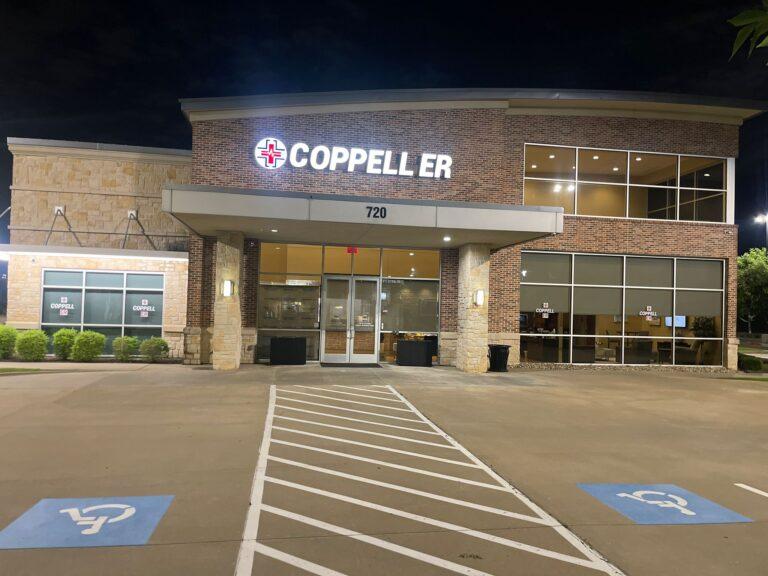Top 7 Causes of Chest Pain After Eating & When to Visit ER OF COPPELL

Introduction
Experiencing chest pain after eating can be scary, especially if you're not sure what's causing it. Whether it’s a sharp, burning, or dull ache, this discomfort might signal something minor—or something serious. Understanding why it happens and when to seek help can protect your health and give you peace of mind.
1. Acid Reflux or GERD
Gastroesophageal Reflux Disease (GERD) is one of the most common reasons for chest discomfort after meals. When stomach acid flows back up into your esophagus, it causes a burning sensation in your chest, often mistaken for a heart attack.
Symptoms of GERD:
-
Burning feeling in the chest (heartburn)
-
Sour taste in the mouth
-
Trouble swallowing
-
Worse pain when lying down after meals
Prevention Tip: Avoid spicy, fatty, and acidic foods. Eat smaller meals and don’t lie down immediately after eating.
When to Visit ER OF COPPELL: If symptoms persist despite medication or worsen suddenly.
2. Gallbladder Problems
The gallbladder stores bile, which helps digest fats. If you eat a fatty meal and experience pain in the upper right or middle chest, it could be a sign of gallstones or gallbladder inflammation (cholecystitis).
Signs Include:
-
Chest or upper abdominal pain
-
Pain after eating greasy or heavy foods
-
Nausea or vomiting
-
Pain radiating to the shoulder or back
Helpful Hint: Stick to a low-fat diet and maintain a healthy weight.
3. Esophageal Spasms
The esophagus is the tube that carries food from your mouth to your stomach. Sometimes, it can spasm during or after eating, mimicking the feeling of heart-related chest pain.
Symptoms:
-
Intense chest pain that comes and goes
-
Feels like food is stuck
-
Pain gets worse with eating or drinking
Treatment Options: Medication to relax the esophagus and stress management techniques.
4. Heart Conditions Triggered by Eating
Sometimes, a heavy meal can put strain on your heart, especially if you already have underlying heart disease. It may trigger angina—chest pain caused by reduced blood flow to the heart.
Look Out For:
-
Chest tightness or pressure
-
Shortness of breath
-
Pain spreading to arms or jaw
-
Dizziness or sweating
Critical Note: If your chest pain feels different, more intense, or is accompanied by other symptoms like nausea or lightheadedness, seek immediate help at ER OF COPPELL.
5. Food Allergies
Some allergic reactions can trigger chest pain shortly after eating. This may be due to the body's immune response, which can cause swelling in the throat or airways, making breathing difficult and causing chest discomfort.
Warning Signs:
-
Hives or skin rash
-
Swelling of lips, tongue, or throat
-
Chest tightness or wheezing
-
Vomiting or diarrhea
Important: Severe reactions (anaphylaxis) require emergency attention. ER OF COPPELL offers 24/7 critical care.
6. Peptic Ulcers
Ulcers in the stomach or small intestine can cause pain after eating, especially if the food irritates the ulcer.
Signs to Watch:
-
Burning stomach or chest pain
-
Bloating
-
Feeling full quickly
-
Nausea
Preventative Tips: Avoid NSAIDs (like ibuprofen), alcohol, and smoking. Use medications as prescribed by your doctor.
7. Hiatal Hernia
A hiatal hernia happens when part of the stomach pushes through the diaphragm into the chest area. This can cause pressure or pain after eating.
Symptoms:
-
Heartburn
-
Chest or upper stomach pain
-
Belching
-
Trouble swallowing
Diet Advice: Avoid large meals and elevate your head while sleeping to reduce symptoms.
When Should You Go to the ER?
Chest pain after eating can range from mild to severe. Here’s when you should NOT wait:
-
Pain feels crushing, tight, or radiates to your arm or jaw
-
Shortness of breath
-
Dizziness or fainting
-
Pain lasts more than a few minutes or comes back
-
You have a history of heart disease
📍 ER OF COPPELL is open 24/7 with no wait time. Our trained staff will run tests, such as ECGs, blood work, and imaging, to quickly find the cause of your chest pain.
How ER OF COPPELL Can Help
At ER OF COPPELL, we offer:
-
Rapid Diagnosis: On-site labs, imaging, and testing
-
Emergency Care: For heart attacks, allergic reactions, and more
-
Specialist Referrals: If needed, we connect you with gastroenterologists or cardiologists
-
Patient-Centered Approach: We listen, explain, and act fast
FAQs
Q1: Is chest pain after eating always serious?
Not always. It could be from acid reflux or gas. But it's important to rule out heart problems or serious conditions.
Q2: Can I treat mild chest pain at home?
Yes, if it’s caused by indigestion or gas. Try antacids, eat slowly, and avoid lying down after meals. If symptoms persist, see a doctor.
Q3: What foods trigger chest pain?
Spicy, fatty, and acidic foods are common culprits. Overeating or eating too fast can also trigger symptoms.
Q4: How is chest pain diagnosed?
Doctors may use an ECG, chest X-ray, blood tests, or endoscopy to find the cause.
Q5: Can anxiety cause chest pain after meals?
Yes, stress and anxiety can affect digestion and cause muscle tension in the chest.
Summary
Chest pain after eating should never be ignored. While many cases are harmless, some may point to heart problems or digestive disorders that need immediate care. ER OF COPPELL is here to help you 24/7, offering expert, compassionate emergency care without the long wait times of a traditional hospital.
- Art
- Causes
- Crafts
- Dance
- Drinks
- Film
- Fitness
- Food
- Παιχνίδια
- Gardening
- Health
- Κεντρική Σελίδα
- Literature
- Music
- Networking
- άλλο
- Party
- Religion
- Shopping
- Sports
- Theater
- Wellness


